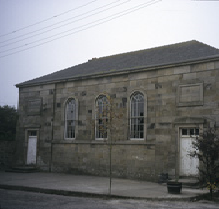
Killaloe Court House
Have you ever wondered why your ancestors may have suddenly and seemingly inexplicably left their family farm? The Ejectment Books might provide an answer.
The Ejectment Books contain information on cases brought before a judge at county Quarter Sessions concerning the ejectment or removal of tenants from the landholdings by their landlords or agents.
A recent inspection of a series of Ejectment Books for Co. Clare for the periods 1840 to 1850 revealed the extent of the information that could be obtained. During these periods the Quarter Sessions for Co. Clare were held at the Court Houses of Ennis, Killaloe and Tulla before a number of named judges. In each ejectment case the following information was recorded:
The name & date of the Quarter Sessions where the Ejectment Case was heard.
The name of Judge.
The name of the plaintiff. In the majority of cases this was the landlord or their agent.
The name or names of the appellant/s. In many cases this could be as many as ten individuals.
The cause of the ejectment case. In the main this was either for non-payment of rent or serious arrears. Even so, the majority of cases must have been brought against tenants at will, those who did not hold security of tenure through a lease.
The precise name and quantity of lands. The name of the townland and local names this might been referred to, Civil Parish and Barony were recorded in the Ejectment Books, together with the number of statute acres concerned.
The yearly rent paid by the tenants against who the ejectment was being sought.
The amount of rent owing if this was the cause of the ejectment case.
The names of witnesses to the case – in some instances. These were called by the appellants in defence of their ejectment. In cases where witnesses were heard the case was often deferred or rejected by the judge. The local parish priest would appear to have been one of the chief witnesses called by the appellants.
While the Ejectment Books seem to provide a reason for families leaving their landholdings, they do not, unfortunately, provide any clue as to what happened next.
Survival of Ejectment Books is patchy and varies from county to county. Few survive for periods prior to 1885, although in some instances, Clare and Cork for example, an almost continuous run of records exists from the 1830s through to the start of the 20th century.
Indexes for some Ejectment Books, for example for Co. Clare, can be found online. In the main, these have to be consulted in their original at the National Archives of Ireland.
